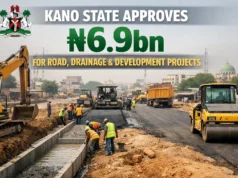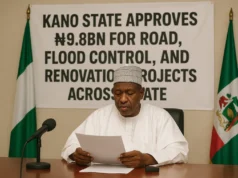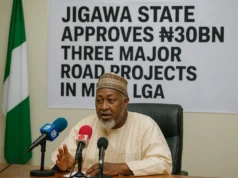On Oct. 16, President Bola Tinubu commissioned the $400 million Green Energy International Limited (GEIL) crude oil export terminal in Otakikpo, Rivers State. This is the first terminal built by any Nigerian company and the only one in the country in over 50 years.
Speaking at the event, the President said the project opens a new chapter in Nigeria’s oil and gas sector and matches his administration’s goals to increase crude oil production with a safe, clear, and efficient evacuation system.
Tinubu, represented by the Minister of State for Petroleum Resources (Oil), Senator Heineken Lokpobiri, noted that the Otakikpo terminal will handle GEIL’s production and provide an easy way out for marginal and stranded fields in the Niger Delta, unlocking billions of barrels of reserves and adding value to the economy.
He stressed that the project shows what his government expects from current licensees, saying after giving global competitive taxes and incentives, they must put fields to work to meet their duties.
On the Ogoni and federal government peace deal, the President said that just recently, the government worked with Ogoni people and other stakeholders in Rivers State to agree on resuming oil exploration in Ogoni land. He called it a big breakthrough that shows Nigeria’s commitment to talks, respect, and sustainable growth, adding that the Otakikpo terminal is more than infrastructure—it signals renewed trust in Rivers State and the Niger Delta.
“Today’s commissioning is more than just opening a terminal; it is a testament of Nigeria’s resilience and commitment, a new era of indigenous participation, and progress in our oil and gas sector,” he added.
On funding challenges in the oil and gas sector, Tinubu said that time will soon end, assuring that the $5 billion African Energy Bank (AEB) is about to start and will make getting funds easier. “Let me also assure Green Energy that the era of perhaps looking elsewhere for finance will soon be over. We have discovered that the biggest challenge we have in Africa is access to finance. And that was why we’ve come up with the African Energy Bank, which is ready to go. Nigeria as the host country has met its obligations. We have met all our obligations, whether legal or financial. We are waiting for the bank to take off, which I think will take off any moment from now,” he said.
According to the President, another major issue in the oil sector is moving crude oil, but the new 750,000 barrels facility, expandable to 3 million barrels, will help fix such problems. He also warned against keeping oil licences forever without real work, saying that era is over. “There is always a minimum work obligation. The minimum work obligation must be met by all those who have marginal licenses. If you don’t have capacity to do it, you better go and look for something else to do instead of wasting your time in oil and gas,” he cautioned.
The Chief Executive of the Nigerian Upstream Petroleum Regulatory Commission (NUPRC), Gbenga Komolafe, called the terminal historic in two ways: it expands Nigeria’s crude export setup at a key time and shows Nigerian operators can deliver world-class projects.
Komolafe said the Otakikpo terminal fits with the country’s 1.8 million barrels per day crude production target and the need for good evacuation. By creating another export hub in Rivers State, it cuts dependence on existing terminals, many of which are full and face security or pipeline issues.
He noted that indigenous operators now make up 30 percent of national production, showing how Nigerians are taking charge of the oil and gas sector. “Also it is of benefit for indigenous producers. In the past, Nigeria independents had to rely heavily on infrastructure owned by international oil companies often at high crude oil handling charges and transportation costs. In this situation we are all aspiring to reduce the unit cost per barrel. The rise of indigenous terminals such as Otakikpo terminal will change that dynamic and give local companies direct control over evacuation. This will not only improve margins but also reduce delays and strengthen their overall competitiveness,” he added.
The Chairman and Chief Executive of GEIL, Prof. Anthony Adegbulugbe, said the terminal now holds 750,000 barrels, expandable to 3 million barrels, with a pumping capacity of 360,000 barrels per day. He shared that since June 2025, the company has done four export operations, totalling 1 million barrels of crude oil.
Beyond the figures, Adegbulugbe said the terminal is a driver for national renewal, opening doors for over 40 stranded fields in the region with more than 3 million barrels of reserves, held back by lack of export setup. He added that these fields could add over 200,000 barrels per day to production.
“This terminal is not just another infrastructure project. It is the realisation of a vision that says Nigeria can lead. That Nigerian companies can deliver. That our energy future is ours to define. I am proud to state that this facility was conceived, designed, and delivered 100 per cent by Nigerian talent. From engineering to construction, it reflects the depth of expertise and capacity that resides in our nation. This should give us all confidence: Nigerian innovation can drive Nigerian success; indigenous operators can execute world-class projects with excellence, within budget, and ahead of schedule,” Adegbulugbe stressed.




